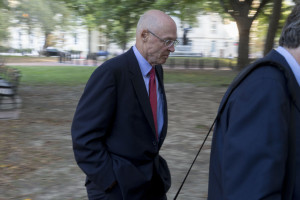

American International Group Inc. received harsher terms than other financial institutions in the 2008 financial crisis because regulators needed to send a message to markets that government help would cost them, Henry Paulson, the former treasury secretary, said in court.
“It was important that terms be harsh because I take moral hazard seriously,” Paulson said, referring to the economic term for consequence-free risks. His appearance on the witness stand in the Washington federal trial of Maurice “Hank” Greenberg’s Starr International Co.’s claim that the government illegally took equity in the insurer was unexpectedly brief.
Starr, AIG’s largest shareholder at the time of the bailout, claims the government punished the insurer by demanding equity and imposing an effective interest rate on the loan of 14 percent, far higher than interest other bailout recipients, such as banks, had to pay. Starr is seeking at least $25 billion in damages for shareholders.
“When companies fail, shareholders bear the losses,” Paulson testified under questioning from Joshua Gardner, a Justice Department lawyer. “It’s just the way our system is supposed to work.”

Paulson said he valued stability above all else in regulating markets, followed by the need for market participants to be responsible for the consequences of their actions.
Greenberg, who built AIG into the world’s biggest insurer, claims the government trampled shareholders rights. The government didn’t have the legal authority to take an 80 percent equity stake in consideration of an $85 billion loan to AIG, Starr claimed in the lawsuit. That equity demand wasn’t made of any other financial institution getting government rescue loans, according to the complaint.
In his testimony, Paulson drew a distinction between AIG’s treatment and that of Citigroup Inc., which he acknowledged received better terms than the insurer.
AIG had to be rescued because if it failed “the country faced a real disaster,” Paulson said under questioning by Starr’s attorney, David Boies.
The government avoided punitive terms for Citigroup because it feared doing so would encourage shortsellers to attack other banks, further destabilizing the economy, Paulson testified.
There was no similar risk of a domino effect in the insurance market, according to Paulson. “I didn’t see another insurance company that was vulnerable” and posed a risk to the entire economy as AIG did, he said.
Paulson said he advocated “fairness to the extent you can have fairness,” but “to me, stability trumped moral hazard.”
In brief follow-up questioning, Boies sought to portray the harsh terms of the AIG rescue as conditions mandated by politics.
AIG had become “a scapegoat for Wall Street and all of the bad practices people were angry about,” Paulson told Boies.
Paulson also acknowledged telling both major presidential candidates, Arizona Sen. John McCain and then-Illinois Senator Barack Obama, that they shouldn’t be unhappy about the AIG bailout because shareholders had been treated harshly.
Paulson said he “wanted to minimize political opposition to what we were doing,” which included appealing to Congress for more money to shore up struggling institutions.
Boies had scheduled to question Paulson for six hours. The former treasury secretary was finished and off the stand in fewer than two.
His early departure left both sides scrambling for witnesses to fill a sudden hole in the trial schedule.
The trial’s first witness, Scott Alvarez, the general counsel of the Federal Reserve Board of Governors, was on the witness stand for more than 13 hours.
Timothy Geithner, the head of the New York Fed at the time of the bailout, was due to testify Tuesday. It was unclear if he would take the stand today.
Ben Bernanke, the former chair of the Fed, is scheduled to testify Wednesday and Thursday morning.
In earlier testimony today, Paulson said he talked with China about helping bail out financial firms in 2008.
In AIG’s case, Paulson said he didn’t think the Chinese would be interested in a deal without a government guarantee.
“The government couldn’t provide that assurance,” Paulson said. “The Chinese were very, very nervous” about investing in U.S. firms at the time, he said.
In last year’s Netflix documentary “Hank,” Paulson discussed how he persuaded banks, Congress and presidential candidates to sign off on almost $1 trillion in bailouts. Geithner has written a book — “Stress Test” — about dealing with the financial, economic and housing crisis that plunged the U.S. into the worst recession since the 1930s.
Boies didn’t draw much out of Paulson regarding how the government arrived at the terms for bailing out AIG. Paulson said repeatedly he didn’t recall many of the details of the rescue package when questioned about it.
The case is being heard by U.S. Court of Federal Claims Judge Thomas Wheeler.
The case is Starr International Co. v. U.S., 11-cv-00779, U.S. Court of Federal Claims (Washington).
Related Articles: